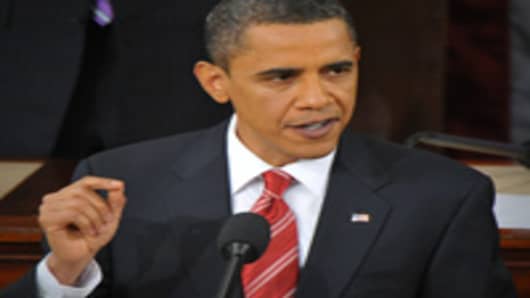President Obama's state of the union address had something in it for everyone last night. The loudest bipartisan cheer occurred when President Obama said, "And tonight, I’d like to talk about how together, we can deliver on that promise. It begins with our economy." For the markets, the most critical component came next.
"So I supported the last administration’s efforts to create the financial rescue program. And when we took the program over, we made it more transparent and accountable. As a result, the markets are now stabilized, and we have recovered most of the money we spent on the banks.....To recover the rest, I have proposed a fee on the biggest banks. I know Wall Street isn’t keen on this idea, but if these firms can afford to hand out big bonuses again, they can afford a modest fee to pay back the taxpayers who rescued them in their time of need."
This was it as far as beating up on the banks.
The speech (coupled with the Federal Reserve statement) had the salubrious effect on the markets and helped stabilize the "Risk Off" theme that Obama had driven hard since last week. Stocks rallied, the US dollar dropped, and bond yields increased.
Other positives from the speech were a mention of fiscal reform (freeze some spending), elimination of all capital gains taxes on small business investment, and "a tax incentive (bonus depreciation extension?) for all businesses, large and small, to invest in new plants and equipment," and an extension of the Bush tax cuts for middle income earners.
The negatives are formally announcing that the Bush tax cuts for wage earners over 250k will roll-off, a small business tax credit for hiring workers or raise wages (proven to be not effective), and the creation of a potential new entitlement program surrounding student loans.
For the US dollar, the President made this important statement: "Third, we need to export more of our goods. Because the more products we make and sell to other countries, the more jobs we support right here in America. So tonight, we set a new goal: We will double our exports over the next five years, an increase that will support two million jobs in America. To help meet this goal, we’re launching a National Export Initiative that will help farmers and small businesses increase their exports, and reform export controls consistent with national security." While anything to eliminate barriers to trade and reform export controls are a good thing, it's tough to export more from this point forward if the US dollar strengthens. So, the read-between-the-lines interpretation is that the US needs a weaker US dollar to help accomplish this goal.



